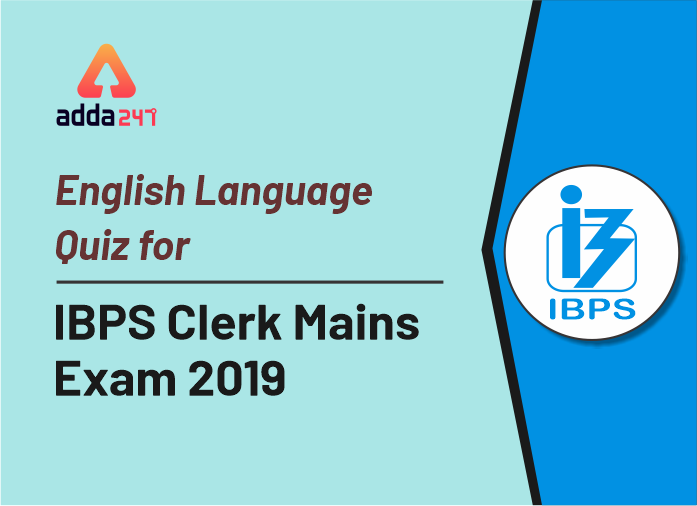English Quiz for IBPS Clerk Mains 27th December
IBPS had conducted the IBPS Clerk Prelims Exam a few weeks ago and the result will be out shortly. Now the next step is to clear the mains exam Thus, the English Language can be an impetus for their success by helping them save crucial time and score good points in lesser time and effort. So, instead of boiling the ocean, try building up a strong vocabulary, an effective knowledge of grammar, and efficient comprehension skills so as to be on the ball to face this particular section. Here is a quiz on English Language being provided by Adda247 to let you practice the best of the latest pattern English Questions for IBPS Clerk Mains Exam.
Directions (1-7): Read the following passage and answer the following questions. Some words are highlighted to help you answer some of the questions.
The proposed Personal Data Protection Bill 2019 fails to protect citizens from the misuse of surveillance powers of the State. While it does well to provide citizens strong protection from misuse of data by private companies, the proposed law gives sweeping powers to the Centre to exempt itself from the protection guaranteed to citizens under the Bill. The biggest concern in the latest draft is that it allows the Centre complete discretion to exempt any entity or department from the provisions of the law. This leaves the citizens vulnerable to surveillance and spyware attacks, such as the recent snooping into private conversations of some WhatsApp users through Pegasus software. By invoking the interest of the sovereignty and integrity of India and the security of the State, the policymakers have ensured that it will have absolute control over consumer data without any judicial oversight.
This could be dangerous in a highly digital world, where consumers of Internet services are increasingly being subjected to surveillance by the state. A recent report by Google’s Threat Analysis Group revealed that there were more than 12,000 warnings sent to users across 149 countries that they were targeted by government-backed attackers. Of this, over 500 users in India were targeted by government-backed attackers. The proposed law does not do anything to assuage concerns over this issue. The other major worry is that the regulatory and monitoring structure will also be appointed exclusively by the government. This is in contrast to the draft circulated in 2018 which said that key appointments will be done by a committee comprising government officials, judicial members, and industry experts. There is no clarity on what constitutes ‘critical’ personal data when it comes to data localization. The new law merely proposes that ‘critical’ personal data cannot be taken out of the country by any entity but has left it to the Centre to define what is critical.
When it comes to processing data by private entities such as Internet companies and financial players, the proposed law has accorded a lot of importance to user consent. For example, sensitive personal data including financial data, health data, sexual orientation, biometric or genetic data, can be transferred outside India only with explicit consent. It also does well to protect children from online predators by making it mandatory for data fiduciaries to verify a child’s age, and obtain the consent of a parent or guardian before processing any data. The new law has also put in place heavy penalties on private entities that violate the provisions of the Bill, in addition to empowering users with the right to delete, correct or transfer personal data. However, it is critical to bring about a balance between the individual, the companies which hold and process our data, and the State. The Parliamentary committee constituted by the Centre to review the provisions of the proposed Bill should iron out the deficiencies.
Q1. How is the proposed bill giving privilege to the center?
(a) A national-level Data Protection Authority (DPA) is set up under the Bill to supervise and regulate data fiduciaries.
(b) The bill gives special power to the center than the state which can further lead to troublesome.
(c) The sweeping power given to the center exempts the government and any entity chosen by the center under the ambit of the bill.
(d) India’s online market is second only to China which will be surpassed soon by this proposed bill.
(e) None of these.
Q2.What is the finding made in the report of Google’s Threat Analysis Group?
(a) A large collection of information about individuals and their online habits has become an important source of profits across the globe.
(b) There are only three types of personal information types categorized as Critical, Sensitive and general across the globe.
(c) Warnings related to communal violence sent to the center across the globe were pegged at 12000.
(d) The Increase in the cases of Government-backed attackers globally.
(e) None of these.
Q3.What is the biggest drawback of the proposed bill?
(a) The right to be forgotten: this right allows an individual to remove consent for data collection and disclosure in the bill
(b) Government policies and interventions for development in various sectors and issues arising out of their design and implementation.
(c) Allowing the center to discrete any entity under the purview of it.
(d) The Bill lays down certain obligations on the data fiduciary which is processing personal data.
(e) None of these.
Q4. How does the proposed bill prevent children from online predators?
(a) Adequate provisions made for soliciting the permission of each child’s parents and cross-checking the age of the child.
(b) The government has given special provisions to the children related NGO who continuously monitors on the
(c) Legal and democratic requirements for local data regimes have to be appropriately balanced with the values of global digital integration.
(d) A special regulatory cell regarding the children’s atrocities is being made by the center.
(e) None of these.
Q5. Which of the following sentences are in line with respect to the passage?
(a) The proposed bill fails to prevent data misuse from private companies
(b) The regulatory and the monitoring structure are appointed by the government.
(c) The bill put heavy penalties on private entities that violate its provisions.
(d) Both (b) & (c)
(e)All of these
Q6. What could be the appropriate title of the passage?
(a) Personal Data Protection Bill doesn’t curb state surveillance
(b) The data Localisation policy
(c) Misuse of data mining
(d) Medication misuse in India: a major public health issue in India
(e) None of these.
Q7. Identify the word which has the same meaning as the given word in bold in the passage.
CRITICAL
(a) Analytical
(b) Unimportant
(c) Derision
(d) Mockery
(e) None of these.
Directions (8-15): In the sentences given below, four words have been highlighted and placed in a sentence. Identify the correct sequence of the words in the sentence. Also, one of the given words will need to be replaced. Identify the correct sequence and the correct replacement and mark that option as your answer.
Q8. An (A) extradition to amend HongKong’s (B) attempt law triggered the (C) good crisis in the city since its (D) handover to China in 1997.
(a) BDAC; B- protests
(b) DCBA; D- strategic
(c) BACD; C- worst
(d) CADB; A- enigma
(e) No interchange required
Q9. In December both sides (A) brink back from the (B) imposing by reaching a “phase one” (C) pushed that stopped America from (D) agreement more penalties.
(a) BDAC; C- concord
(b) DCBA; D- vague
(c) BACD; B-reach
(d) CADB; C-pulled
(e) No interchange required
Q10. Warnings about a slowing world (A) casual were a (B) economy for the Federal Reserve when it decided to cut (C) financial rates for the first time since the (D) consideration crisis.
(a) BDAC; A- interest
(b) DCBA; D- anger
(c) BACD; B- malady
(d) CADB; C- escape
(e) No interchange required
Q11. A horrified (A) cathedral watched on Tv as a fire (B) interior the roof and some of the (C) rule of Notre Dame (D) world in Paris.
(a) BDAC; C- influence
(b) DCBA; C- destroyed
(c) BACD; A- harsh
(d) CADB; A- mud
(e) No interchange required
Q12. Iran moved further away from the deal(A) deviation its nuclear (B) limiting, saying it would no longer abide by the (C) agreement unless the EU provided it with (D) economic aid.
(a) BDAC; C- sick
(b) DCBA; D- powerful
(c) BACD; A- activities
(d) CADB; A- steep
(e) No interchange required
Q13. Italy got a (A) new government (B) formed by the Democratic Party and Five Star Movement. Matteo Salvini, the hardline(C) coalition of the Northern League, was shut out of the (D) thirst.
(a) BDAC; C- stormy
(b) ABDC; D- leader
(c) BACD; A- collide
(d) CADB; A- embrace
(e) No interchange required
Q14. The left-behind (A) deindustrialisation of the north are not its cities but its towns. Many have still not (B) uncovered from (C) parts under the Conservative (D) governments of the 1980s.
(a) BDAC; C- gentle
(b) DCBA; D- hostile
(c) BACD; A- expedite
(d) CBAD; B- recovered
(e) No interchange required
Q15. Giving more (A) help to English city mayors would (B) glitches them draw up (C) integrated regional-transport (D) plans.
(a) BDAC; C- gentle
(b) DCBA; D- evacuate
(c) BACD; B- powers
(d) CADB; A- advantage
(e) No interchange required
Solutions
S1. Ans. (c)
Sol. Referring to the first paragraph, it is evident that the only correct option is option (c) which is mentioned from the lines of the passage “While it does well to provide citizens strong protection from misuse of data by private companies, the proposed law gives sweeping powers to the Centre to exempt itself from the protection guaranteed to citizens under the Bill.”
S2. Ans. (d)
Sol. Referring to the second passage, it is pretty clear that the correct option is option (d) which can be evident from the lines of the passage, “A recent report by Google’s Threat Analysis Group revealed that there were more than 12,000 warnings sent to users across 149 countries that they were targeted by government-backed attackers.”
S3. Ans. (c)
Sol. Referring to the lines in the first paragraph, it is quite evident that the correct option is option (c). This can be evident from the lines of the first paragraph, “The biggest concern in the latest draft is that it allows the Centre complete discretion to exempt any entity or department from the provisions of the law.”
S4. Ans. (a)
Sol. Referring to the lines in the third passage, it is pretty clear that option (a) is the correct answer choice. This can be illustrated through the lines of the passage, “It also does well to protect children from online predators by making it mandatory for data fiduciaries to verify a child’s age, and obtain the consent of a parent or guardian before processing any data.”
S5. Ans. (d)
Sol. Referring to the lines of the passage,’ The other major worry is that the regulatory and monitoring structure will also be appointed exclusively by the government.’ Option (b)
‘The new law has also put in place heavy penalties on private entities that violate the provisions of the Bill.’ Option (c)
It is pretty clear that option (d) only holds true. This makes our correct answer choice option (d).
S6. Ans. (a)
Sol. Referring to the whole passage, it is clearly evident that option (a) is the correct option.The passage talks about the “personal protection bill” and its existing glitches regarding surveillance.
S7. Ans. (a)
Sol.The word ‘Critical’ means involving the objective analysis and evaluation of an issue in order to form a judgment, which is same as ‘Analytical’
Derision means contemptuous ridicule or mockery which is similar to satire.
S8. Ans. (c)
Sol. For the highlighted words, the correct arrangement will be BACD. Also, “good” must be replaced with “worst” to make the statement grammatically and contextually correct.
S9. Ans. (d)
Sol. For the highlighted words, the correct arrangement will be ‘CADB’. Also, “pushed” must be replaced with “pulled” to make the statement grammatically and contextually correct.
S10. Ans. (a)
Sol. For the highlighted words, the correct arrangement will be ‘BDAC’. Also, “casual” must be replaced with “interest” to make the statement grammatically and contextually correct.
S11. Ans. (b)
Sol. For the highlighted words, the correct arrangement will be ‘DCBA’. Also, “rule” must be replaced with “destroyed” to make the statement grammatically and contextually correct.
S12. Ans. (c)
Sol. For the highlighted words, the correct arrangement will be ‘BACD’. Also, “deviation” must be replaced with “activities” to make the statement grammatically and contextually correct.
S13. Ans. (b)
Sol. For the highlighted words, the correct arrangement will be ‘ABDC’. Also, “thirst” must be replaced with “leader” to make the statement grammatically and contextually correct.
S14. Ans. (d)
Sol. For the highlighted words, the correct arrangement will be ‘CBAD’. Also, “uncovered” must be replaced with “recovered” to make the statement grammatically and contextually correct.
S15. Ans. (c)
Sol. For the highlighted words, the correct arrangement will be ‘BACD’. Also, “glitches” must be replaced with “powers” to make the statement grammatically and contextually correct.
You may also like to read:





 English Language Quiz For Bank Foundatio...
English Language Quiz For Bank Foundatio...
 English Language Quiz For SBI Clerk Prel...
English Language Quiz For SBI Clerk Prel...
 English Language Quiz For SBI Clerk Prel...
English Language Quiz For SBI Clerk Prel...





